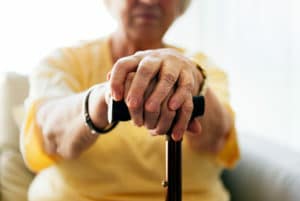
While balance problems are much more common in seniors than in children or younger adults, it is not necessarily “normal” to lose balance and fall later in life. Dizziness and vertigo may indicate an underlying health condition.
What Causes Poor Balance
The human body balances itself using a complex system. If just one part of the system is impaired, you may feel okay, but as more and more parts break down, your body becomes disoriented by its own cues. To feel steady and grounded, you must have function in your:
- Inner ear
- Eyes
- Muscles and joints, especially in the feet, legs and torso
- Nervous system
#1 Vestibular System
The vestibular system, or inner ear, constantly monitors how the head and body are positioned. Three tubes called the semicircular canals contain fluid to help you balance. When your head tilts or your body moves, the fluid shifts, moving hair follicles that send signals to your brain through the connected nerves. If the vestibular system is functioning as it should, you feel steady, but if it’s activated while you’re sitting or standing still, dizziness and vertigo can ensue.
The most common vestibular disorder in older adults is Benign Paroxysmal Positional Vertigo (BPPV). It is caused by the formation of small calcium carbonate crystals called otoconia, or “ear rocks.” These rocks can displace the inner ear fluid or stimulate nerves when you make simple motions, such as looking up or getting out of bed, causing the room to feel like it’s spinning. Fortunately, BPPV can often be corrected with a physical maneuver that coaxes the crystals back into an inner ear chamber where they won’t cause vertigo.
#2 Vision
It is no secret that vision deteriorates with age. In some cases, all that’s required is a simple change in the strength of a prescription. However, vision issues can also be caused by more serious problems, such as:
- Cataracts
- Glaucoma
- Macular degeneration
- Diabetic retinopathy
Without the appropriate visual stimuli, your body cannot understand your movements correctly. This is especially true if you sense movement with your feet and inner ear that does not match up with what you see.
#3 Proprioception
Have you ever tripped because your foot or leg went numb after sitting on it wrong? Chances are, you couldn’t sense the ground underfoot and didn’t know how much pressure to put down.
If the sensation in your feet, legs, torso and spine is permanently weakened, you can develop more serious, long-lasting balance issues. Some conditions that limit your body’s ability to sense your position include:
- Swelling of the ankles and feet
- Diabetic neuropathy
- Arthritis
Treating the issue directly may help you regain balance. You may also want to wear well-fitted shoes that won’t catch easily on uneven surfaces.
#4 Joint and Muscle Strength
Muscles atrophy and joints wear down as you get older. This makes it harder to support your own weight without experiencing pain or having your muscles “give out.” In many cases, strengthening exercises and physical therapy can help restore the function of your joints and muscles so you feel more confident when performing physical activities.
#5 Other Causes
Neurological disorders – Seniors have an increased risk of neurological conditions that can affect all types of motor function, including balance. Examples include Parkinson’s disease, cervical spondylosis, brain stem stroke and multiple sclerosis (MS).
Medication – Many common medications come with side effects of dizziness and nausea. Discuss switching to a different medication with your doctor if balance is a concern.
Cardiovascular problems – Heart disease or abnormally low or high blood pressure can cause dizziness.
Blood sugar – Low or high blood sugar, drastic changes in blood sugar and diabetes can all contribute to balance issues.
Balance Therapy and Rehabilitation in Metro Atlanta
Feeling off-balance can be frightening if you live alone. Falls at any age can be serious, but they are especially dangerous for seniors. At A.G. Rhodes Health & Rehab, our care teams work with you to redevelop the strength you need to move about life more confidently. We have short-term and long-term care options, depending on your concerns, and both groups have access to our therapy and rehabilitation programs.
Between all our locations, we offer specialized gyms for tracking and improving your balance, an anti-gravity treadmill for recuperation from injuries and a therapy pool for rebuilding muscle through low-impact exercises. Contact us today at 877-918-6413 to learn more or schedule your tour.
1 http://nationaldizzyandbalancecenter.com/resources/what-causes-dizziness-vertigo/

